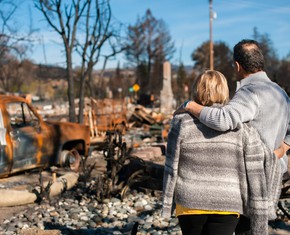The views expressed in our content reflect individual perspectives and do not represent the authoritative views of the Baha'i Faith.
When he was about six years old, one of my sons asked me “Dad, does life have a rule book?”
That startling, precocious question probably originated from playing soccer or baseball or chess, and trying to understand the rules of such complex games. At about that age, you start figuring out that most things in this world have rules, laws, boundaries and regulations, and you naturally want to learn them. In fact, that may be one of the reasons children take such delight in games and sports—they get to learn the rules and play by them. When the rules outline the boundaries of fairness and justice, they become important, and kids naturally understand that moral importance.
I had to think for a moment about how to answer his question, but then I remembered one of my favorite passages from the Baha’i teachings:
Religion, moreover, is not a series of beliefs, a set of customs; religion is the teachings of the Lord God, teachings which constitute the very life of humankind, which urge high thoughts upon the mind, refine the character, and lay the groundwork for man’s everlasting honour. – Abdu’l-Baha, Selections from the Writings of Abdu’l-Baha, pp. 52-53.
I told my son that the rule book of life—the spiritual guidelines we could follow—came to us from the prophets and messengers who founded and taught the world’s great Faiths. “Religion,” I said, trying to keep it simple enough for a six-year-old, “gives us the rules of how to live a good life.”
“Yes,” he said, “I know that. But what are they?”
“So you want an actual list?” I asked.
“Yes,” he said.
Oh, boy. This parenting thing, I once again thought to myself, isn’t going to be easy.
“Tell you what,” I said, “let me see what I can find for you. Give me a few days and we’ll talk about this again.”
Luckily that sounded reasonable to him, and he ran back outside to play, so my temporary reprieve and I went to my Baha’i book collection to search for some rules a six-year-old could comprehend.
The Baha’i Faith, I learned when I first encountered it, does not have a complicated, convoluted legal code or a whole host of hidebound rules. Baha’u’llah, the prophet who founded the Baha’i Faith, said:
Think not that We have revealed unto you a mere code of laws. Nay, rather, We have unsealed the choice Wine with the fingers of might and power. – The Most Holy Book, p. 21.
His son Abdu’l-Baha, the exemplar of the Faith, emphasized spiritual rather than material rules:
The essential thing is the spiritual law – the outer material law is of small moment, because material life has natural laws to protect it, but humanity lacks spiritual education and needs instruction on the divine qualities. – Abdu’l-Baha, Divine Philosophy, p. 69.
The Universal House of Justice, the democratically-elected body that administers the global Baha’i community, put it this way:
A believer cannot fulfil his true mission in life as a follower of [Baha’u’llah] merely by living according to a set of rigid regulations, as you will recognize. It is neither possible nor desirable for the House of Justice to lay down a set of rules covering every situation. Rather is it the task of the individual believer to determine, according to his own prayerful understanding of the Writings, precisely what his course of conduct should be in relation to situations which he encounters in his daily life. – Messages 1963 to 1986, p. 414.
This rule of individual investigation and responsibility, and the fact that the Baha’i Faith has no clergy, priesthood or ministry, means that Baha’is have to determine, for themselves, what kind of conduct they will follow. The Baha’i teachings certainly offer a set of spiritual laws and guidelines, but no one looks over your shoulder to dictate or enforce them—instead, for Baha’is, the ideal rule book is an internal one, a self-directed spiritual path. The daily decisions on that spiritual path have to do with the human conscience, with our built-in moral imperatives, with our basic sense of right and wrong.
But how do you explain that to a six-year-old?
I struggled with the question for a while, until I found a beautiful letter Abdu’l-Baha had written to a woman who asked for a rule to guide her life:
O thou dear handmaid of God! Thy letter hath been received and its contents noted. Thou didst ask for a rule whereby to guide thy life.
Believe thou in God, and keep thine eyes fixed upon the exalted Kingdom; be thou enamoured of the Abha Beauty; stand thou firm in the Covenant; yearn thou to ascend into the Heaven of the Universal Light. Be thou severed from this world, and reborn through the sweet scents of holiness that blow from the realm of the All-Highest. Be thou a summoner to love, and be thou kind to all the human race. Love thou the children of men and share in their sorrows. Be thou of those who foster peace. Offer thy friendship, be worthy of trust. Be thou a balm to every sore, be thou a medicine for every ill. Bind thou the souls together. Recite thou the verses of guidance. Be engaged in the worship of thy Lord, and rise up to lead the people aright. Loose thy tongue and teach, and let thy face be bright with the fire of God’s love. Rest thou not for a moment, seek thou to draw no easeful breath. Thus mayest thou become a sign and symbol of God’s love, and a banner of His grace. – Abdu’l-Baha, Selections from the Writings of Abdu’l-Baha, pp. 26-27.
In this series of essays on Abdu’l-Baha’s rules for a spiritual life, we’ll examine the depth and breadth of the profound wisdom in this remarkable paragraph, and try to understand its sage guidance and advice on a practical level.
Next: Keep Your Eyes Fixed on the Exalted Kingdom
You May Also Like
Comments

















...
The question was about what boundaries, laws, regulations, and rules life has rather than a specific religion. Life would have a non-sectarian code apparently if there were one life standard apart from all those of the various religions of the world. A six year old wouldn't understand those nuances though. As a six year old isn't a fifteen year old or above, that technically makes them the child of a Baha'i rather than a Baha'i.
Also, I'm typing spaces, but when I hit post, sometimes the species ...are retained. At other times, posting ignores paragraph spacing and turns stuff into a wall of text despite me not typing it as such.
Technically, the question was what boundaries, laws, regulations, and rules does life (the world, the universe, the cosmos, ...etc) have rather than what boundaries, laws, regulations, and rules any specific religion has? Also, religion itself but rather specific religions are what people get their boundaries, laws, regulations, and rules transmitted through. A Jew, Christian, Muslim, Hindu, Buddhist, Sikh, Unitarian, or whomever else (or any variant denomination of the above) is obviously likely to view the boundaries, laws, regulations, and rules neccesarily to lead a good life differently from the others in speicifcs.
The Wikipedia page on Baha'i laws does have a huge list of prohibitions from the Kitab-I-Aqdas, so it does have a complicated, convoluted legal code after all. Also, a lot of the rule are under the category of rules specific to a specific religion, hence it doesn't deal with the issue of the legal code of life as opposed to a specific religion.
This is all highly advanced stuff, so I wouldn't know how to explain all this to a six year old or the practical implications this has for all the culture war issues currently being debated in the world.
the United States and the United Kingdom, culture war refers to a conflict between traditionalist or conservative values and progressive or liberal values. Beginning in the 1990s, culture wars have influenced the debate over public school history and science curricula in the United States, along with many other issues.
The expression culture war entered the vocabulary of United States politics with the publication of Culture Wars: The Struggle to Define America by James Davison Hunter in 1991. Hunter perceived a dramatic realignment and polarization that had transformed United States politics and culture, including the issues of abortion, federal and state gun laws, global warming, immigration, separation of church and state, privacy, recreational drug use, homosexuality, and censorship.
In Canada, culture war refers to differing values between Western versus Eastern Canada, urban versus rural Canada, as well as conservatism versus liberalism.
Christmas controversy
Counterculture
Cultural conflict
History wars
Red state vs. blue state divide
World Chess Championship 1972 background
Battleground issues in the "culture wars"
Life issues
Capital punishment
Universal healthcare
Abortion / Reproductive rights
Right to die movement and euthanasia
Stem-cell research
Sexuality
Age of consent
Homosexuality, Gay rights, and Same-sex marriage
Pornography
Sex work
Sexual revolution
Polyamory
Education and parenting
Creation-evolution controversy
Family values
Homeschooling and Educational choice
Corporal punishment and Child discipline, most notably spanking
Sexual education and abstinence only education
Drugs
Legal drinking age
Recreational drug use and Drug decriminalization
Harm reduction
War on Drugs
Environment and Energy
Global warming and climate change mitigation
Society and culture
Animal Rights
Feminism
Gun politics
History wars
Immigration
Race, affirmative action
Media bias in the U.S.
Moral absolutism vs. Moral relativism
Multiculturalism
Permissive society
Political correctness
Secularism and Secularization
Law and Government
Capital punishment
Law and order
Separation of church and state
Crypto wars
All of these are over the head of a six year old, but are relevant to the issue of what are the boundaries, laws, regulations, and rules of life. The paragraph you are basing the series of essays on has nonsectarian advice for all people, but doesn't really address the sectarian nature of the culture wars.